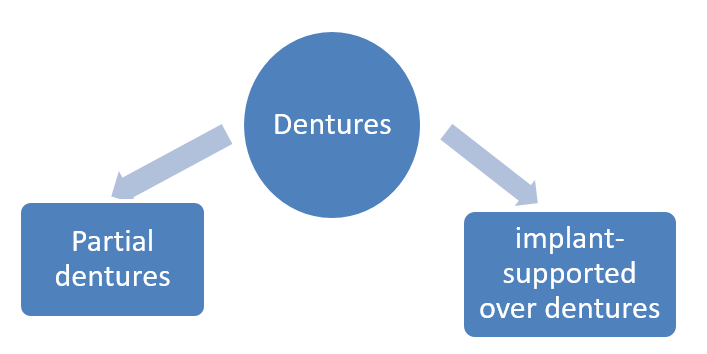Dentures
- Home
- Treatments
Total or partial loss of tooth , if left untreated, not only affects an individual’s self-image — it may even rise the risk of having nutritional problems along with other systemic health disorders. Luckily, there exists a reliable as well as a time-tested method to cure this condition. They are called full or partial dentures.

What are dentures?
Dentures are considered to be one of the most preferred option to replace the missing teeth; some of the other remedies are fixed bridgework or dental implants. Each of the method has its pros and cons, which needs be considered very carefully. Which is the best option would depend on the individual and the situation of the teeth.

How Do Removable Dentures Work?
The Full or partial dentures have a gum-colored base which is made of plastic resin. This part rests over the left over alveolar (bone) ridge which had earlier held the teeth. The prosthetic teeth projecting from the base have been designed to appear and perform just like the real teeth. The dentures are held in place by using the suctioning effect at their close fit against the alveolar ridges. This is the reason why it is so imperative that they are placed properly. The upper denture gets extra support from the large surface area at the roof of a mouth (palate), which makes it extremely stable.
Life with dentures
So how does it feel like while wearing dentures? What are its benefits
- Initially, wearing dentures require some adjustment for talking and eating, as it takes time for the dentures to get “balanced” in the space earlier occupied by the teeth.
- Gradually, the muscles, nerves and the ligaments of the mouth adapt to work in the new technique, which allows the functions to be performed normally.
- Dentures even support the facial skeleton along with some soft tissues of the lips and cheeks.
- Dentures help to create a youthful appearance of the face.
Do's and Don'ts
| Dos | Don’t |
| See the Dentist for a Loose Fit | Don’t Use Tugging Motions When Eating |
| Rinse Dentures before Putting them in Your Mouth | Avoid Hot Water. |
| Remove Before sleeping and Soak Overnight | Don’t Use Bleach-Containing Products |
| Brush the Dentures Daily. | Don’t Use Sharp Objects |
| Remove and Rinse Dentures after meals | Avoid Abrasive Cleaning Materials. |
FAQs
There are a wide variety of options available . Some of the latest and popular dentures are listed below:
a) Immediate Dentures: These dentures are generally a temporary means to aid an individual in the transition to successful denture wearing.
b) Conventional Full Dentures: After some time, permanent dentures which can conform to the mouth with near-perfect accuracy may be designed.
c) Implant-Supported Overdentures: To enhance the stability of either a lower or an upper denture, it is possible for it to be anchored by using two or more dental implants.
In the step, an accurate impression (mold) of the alveolar ridges is made on the top as well as bottom of the mouth. Next, the base of the denture is created from this mold at a dental laboratory. Here the dentist and the lab technician select from among different sizes and shapes of prosthetic teeth that help to re-create a natural-looking smile. Once all the parties are satisfied with the result, these temporary dentures are also made in permanent form.
If an individual has recently lost his teeth and received an immediate denture, it is considered to be normal to identify certain tissue shrinkage and bone loss occurring. Henceforth, in several months to come one may find that the immediate dentures are no longer fit well. In such a scenario, the set of conventional full dentures, that may last longer and fit better.
